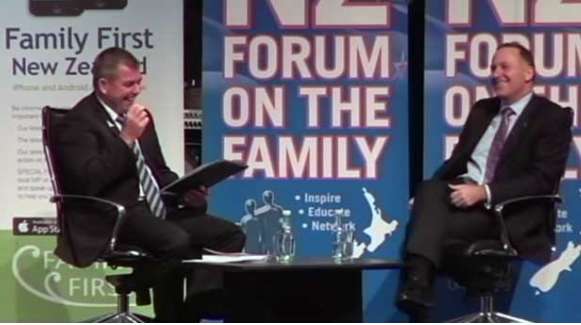Family advocacy can be political and charitable, rules New Zealand judge
 MercatorNet 1 July 2015
MercatorNet 1 July 2015
A New Zealand organisation promoting the natural family has won a decision from the country’s High Court that its political activities do not necessarily disqualify it as a charity.
Justice Collins ruled that Family First NZ’s advocacy of the traditional family makes it similar to “organisations that have advocated for the ‘mental and moral improvement’ of society” – that is, one of the classic types of charitable activity.
Family First was granted charitable status by the then Charities Commission in May 2007 but was served notice of deregistration by the Charities Board, which replaced the commission, in September 2012 during the run-up to the legalisation of same-sex marriage in April 2013.
In fact, the Charities Board confirmed its decision to deregister Family First just two days before the gay marriage law was passed. The juxtaposition of events made it very clear that the family group’s public campaign to preserve traditional marriage was the deciding factor in the Board’s decision.
Today’s decision from the Supreme Court allows an appeal by FFNZ against its deregistration, and orders the Charities Board to reconsider its move against the group. It follows a similar appeal won by Greenpeace NZ last August after the Charities Board ruled its purposes, like those of the family advocates, primarily “political” rather than “charitable”.
However, a majority of the Supreme Court in the Greenpeace case ruled that an organisation with charitable purposes could also have political purposes, depending on the objectives being advocated and the means used to promote those objectives.
Greenpeace and Family First make unusual bedfellows but taken together their appeals amount to a breakthrough for many charitable groups, as FFNZ national director Bob McCoskrie pointed out:
“This decision is a victory for the many charitable groups – both registered, deregistered and wanting to be registered – who advocate for their causes, beliefs, and supporters and often have to engage in political activity, not always through choice but through necessity. It is a victory for open robust debate on issues that affect families.”
(Among the currently registered are groups that opposed FFNZ during the gay marriage debate – without incurring the displeasure of the Charities Board.)
In his decision Justice Collins said that the Charities Board should take into account the Greenpeace ruling – and his own – when deciding FFNZ’s status, and should not be influenced by whether or not board members actually like the family group’s views (as, clearly, they do not):
[87] In this respect, I believe there is force to the submissions of Mr McKenzie QC, counsel for Family First. He argued that Family First’s purposes of advocating its conception of the traditional family is analogous to organisations that have advocated for the “mental and moral improvement” of society.
[88] In recognising the strength of Mr McKenzie’s submission, I am not suggesting the Charities Board must accept Family First’s purposes are for the benefit of the public when it reconsiders Family First’s case.
I am saying, however, that the analogical analysis which the Charities Board must undertake should be informed by examining whether Family First’s activities are objectively directed at promoting the moral improvement of society. This exercise should not be conflated with a subjective assessment of the merits of Family First’s views. Members of the Charities Board may personally disagree with the views of Family First, but at the same time recognise there is a legitimate analogy between its role and those organisations that have been recognised as charities. Such an approach would be consistent with the obligation on members of the Charities Board to act with honesty, integrity and in good faith.45
The refusal of the Charities Board to review their decision against Family First straight after the Greenpeace case seems to indicate something other than good faith.
“It is disappointing that it took a Judge to remind the Charities Board to recognise the precedent set in the Greenpeace case. When the Greenpeace case was decided, we asked the Charities Board to reconsider their decision to deregister us, but they refused to. This has cost both Family First and the taxpayer thousands of dollars in legal fees,” says Mr McCoskrie.
“When a group who promotes the natural family as a fundamental social unit is deemed of ‘no public benefit’, you know a country is in deep trouble. The original decision to deregister Family First during the recent marriage debate was a highly politicised one.”
http://www.mercatornet.com/conjugality/view/family-advocacy-can-be-political-and-charitable-rules-new-zealand-jud/16438






